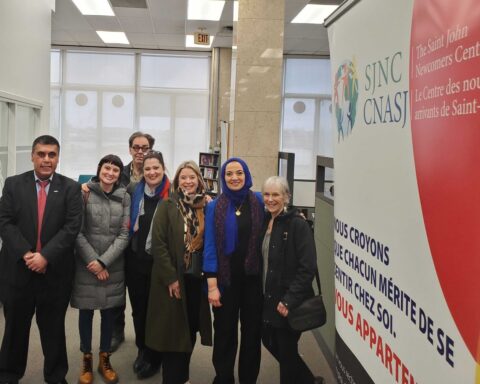New realities of providing settlement services to immigrants and the future vision for the settlement sector in Canada were discussed at the Pathways to Prosperity Conference, held in Ottawa this past November.
A few discussion trends have given me the proverbial food for thought: social financing, cooperative partnerships, Internet-based services, and MOOCs (Massive Open Online Courses).
Social financing or social impact financing is the latest new thing in funding social services. Examples in literature are still sparse and somewhat confusing, but the idea seems poised to stay. Presentations by the MaRS Discovery District have praised the benefits of social financing and encouraged service-providing agencies to seek partnerships in pursuit of joint ventures. With Goldman Sachs recently announcing a foray into social financing, we may see other image improvement-seeking institutions follow suit. So, as a sector, I think we need to overcome our — or at least my — fear of big business, and keep our eyes open to new opportunities.
Partnership and Cooperation
As for the partnership and cooperation potential of the settlement sector, I have some doubts. The very basis of the funding structure of service providers is inherently competitive, rather than cooperative, thanks to years of delivering programs based on the number of clients served and the number of services they received. Some local partnerships have developed, but the very nature of securing contribution agreements through a bidding process created a competitive, rather than a cooperative mindset.
Some local partnerships have developed, but the very nature of securing contribution agreements through a bidding process created a competitive, rather than a cooperative mindset.
With face-to-face delivery of services, those competitive attitudes were limited to the geographic area where the clients were located. However, that may be changing, as more and more services are being delivered online. With the online, non-geographically-limited services of the future, an obvious question comes to mind: are service providers now in competition not only with organizations geographically close by, but with those a country apart as well? If this will be more and more be the case, the challenges in finding cooperative advantages rather than being worried about the competitive disadvantages may be even greater.
The Future of Online Services
Discussions of online delivery of services and programs invariably include MOOCs, which are courses offered over the Internet that are open to a large number of participants (hundreds or thousands). They can be free of charge or offered at quite nominal fees. Many Ivy League institutions have ventured into them — most are still trying to figure out how to monetize on this new trend. While some educational institutions worry about becoming replaced by this invasion, according to some experts, MOOCs will never be able to deliver the grant/revenue generating potential large educational organizations seek.
It may be that MOOCs are meant to be government-funded. In some ways, the premise of MOOCs is very similar to the premise of government-supported services. They both:
• Aim to reach as wide an audience as possible
• Offer free or very low cost services that have value added
• Are fronted by an organization that has name recognition
• Aim mostly for general knowledge or information building, not credit or diploma granting
The above model is similar to the one generally used to fund services for immigrants across Canada, such as through information and referrals, language assessment or language training. As such, they do lend themselves to the MOOC format. Clients who need help with preparing for a Canadian Citizenship test, placing a child in a school system, conducting a job search or learning English or French for daily living, workplace, or employment preparation, may join any of the government funded MOOCs on the topic: delivered online, anytime, anywhere, at their convenience, at their fingertips.
All we would need to ensure is that local contexts are taken care of and that blended services — a face-to-face introduction to the online environment — support the most challenged clients in accessing the service.
How does the above sound as the future of the settlement sector in Canada?
At times, it sounds a little daunting and a little scary. But at the same time, it’s exciting to look forward to changes that will help meet the revolving and increasingly more complex needs of our clients.
With good cooperation and coordination, all the expertise the sector has developed over the past several years can lead to the creation of an excellent delivery model for the future — one that we can all be proud and excited to be a part of.




